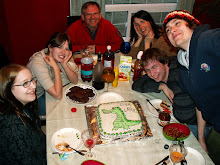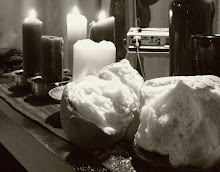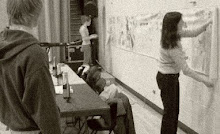Last week at ROC we talked about money and worshiping through giving. We considered Jesus' words when he said things like "store up treasures in heaven" or "where your treasure is, there your heart will be also." It is obvious that Jesus considered what we value and what our hearts will follow to be the same thing.
Worshiping God means valuing in our hearts Him as most valuable and infinitely valuable. If our hearts are bent on relationships, materials, position or self as the most valuable thing in life then it is not worshiping God. The opposite is in fact true. When it comes to the issue of money and giving to God we come to the issue of idolatry. God is the only one worthy of our lives. Worshiping also means reflecting, outwardly, the inward value of God. What we do reflects our values. In I Samuel God says to Samuel, "The LORD does not look at the things man looks at. Man looks at the outward appearance, but the LORD looks at the heart." While it is not the outward reflections are empty without inward treasure, Jesus still says "Store up treasures in heaven." To Nathan Warren paraphrase that verse "invest in heaven." The apostle Paul calls the faithful in Christ Jesus to "live all of life to the glory of God" (Colossians) and to live as "living sacrifices" (Romans). The life that follows Christ is to worship God in every area of life. We are called to obey God by magnifying his worth and honoring the reputation of his name in every area of our lives. Money is a huge part of life. Especially in our culture, money is a necessary part of our lives to function. In our culture it is what the world and a lot of influences would say makes one happy. And we have a whole lot of it. If money is such a big part of life it needs to be used to worship God. Money should be used to show God how valuable he is to us. When we sacrifice our money we tell God we is more valuable than our money.
The church is a giving community. Every community of faith is a giving community. In a community of giving everyone shares the load of treasuring God. Jesus even goes so far as to command his disciples to sell their possessions and give alms to the poor. Jesus calls his disciples to actually sell their possessions to have money to give to the poor and weak. The early church obviously took these words very seriously. Acts 2 describes them taking that command to be very literal. They sold their possessions, all of them. The community of believers all had their things "in common." They shared the load as people that each treasured God as infinitely valuable. Each contributed.
Now, there are many groups that are not communities that share giving as the church does. Families have a sense of what the church is. The early church was thought to be incestuous because they called each other 'brother' and 'sister.' There is an image of the family in the church. Not when it comes to giving though. In families mom and dad pay for their kids. Some have the gift of giving, but it is not their job to support the church. We all give, regardless of amount, equally. In boy scouts I was asked to bring a dollar each week. Everyone was asked to contribute equally. While this solves the ‘everyone sharing the load’ problem, it is still not a giving community. The money is to pay for a building and to fill a cost. And, those who have more money are not required to give more. Jesus says in Luke 12 that for he who has been given more, more will be demanded. A charitable foundation is also something that is not quite there either. Although it gives to a need it is not the church.
In the Bible there are two types of giving that one would find. Biblical giving is simply just giving money to God. But, outward reflections of treasuring God and giving to him can probably be worked out two ways. The first is the example we find in Leviticus 27:30 where the Levites demand a tithe (a tenth of one’s possessions) to give to God. They say “It is Holy to the LORD,” that it is his possession. God demanded from his chosen people as an act of obedience a certain bit from whatever they owned. In the book of Malachi God says that his people are stealing from him when they don’t give their tithe. The second example is from the heart and in response. Jesus says when you care for one of these poor people you have cared for me. He commands his followers to even sell their possessions and give to the poor. His disciples had no money and so Jesus tells them to sell their possessions so that they can give to the poor. They had no bank accounts to withdraw from.
There are also a few things to note when it comes to true giving. True giving is given to God. We do not give to pay a bill or fill a position. Biblical worship through giving is given to God. True giving is also something that should be hard to do. Giving when it hurts is actually healthy giving. When the Pharisees are giving Mercedes Benzes and state of the art laptops an old women drops a mere two bucks. It was all she had to give. Jesus says that she gave the most because she gave all she had while the others gave from their wealth. In my first year my professor taught me that when the offering plate came around that it was more appropriate to put your whole self into it. Jesus also owns everything we have and are anyway. God also provides for giving. Jesus does not excuse the poor from giving. And, giving magnifies God’s worth. When we give we declare God as a providing Sheppard and a generous father who loves to lavish on his children. Sometimes I worry about the future. Specifically about how I’m going to pay for school next fall. It occurred to me that maybe I should be more afraid of not having money to give to God. What if God judged me for not having something to offering? It’s just something I thought of.
At ROC we want to reflect the treasure of being able to give in this way; in the way that Jesus prescribes for us. We do this by giving away half of our resources every year. Here is a bit of a long quote from our ministry plan, “We do this [give half to the community] because the only way this kind of mission/vision can happen is if the community embraces it. This is not just for people who have lots of money to give. It is something that everyone who considers themselves a part of ROC needs to be aware of. We want a very high buy in. It just can’t work if only the leadership team is committed. This is not a money thing. It is a mission thing. We need all of our community to embrace our vision, no matter how much each person is able to give.” We have the unique opportunity to give away into our community a large portion of our giving because we don’t have a building or paid pastor.
Right now our giving does not reflect our treasure. We are short by half to just cover our own expenses for the month of February. We rent the Y and pay the preacher. I am hesitant to say this but right now it is true. This is an eye-opener for me as well, especially since I’ll admit that I am not strong giver at all. I would never intend to set up a belittling tone to what I’m saying. It’s the truth and a reminder. I would never consider what I’m saying to be “us and them.” What I do want to call us to is ownership of House of ROC. Giving is a way of taking part in House of ROC. It is not the only way but it is a way I think needs to happen from each part of ROC. Again this is about our mission and ownership of ROC. I want to call you to take part in ROC and our community, This is one way to do it.











1 comment:
Thanks for this reminder of your talk on Saturday Nathan. It's really great to be able to read it and be challenged again in this area. I do believe that this needs to be an ongoing conversation at ROC, something that we talk about boldly and lovingly with each other and that we challenge each other, that as a community, we live up to what God is calling us to do.
In our discussion about this during the gathering, the thing that struck me and I didn't have a chance to say, was how saddened I am at the idea of losing the part of our mission where we give away $$$. Of course we can give more of our time and energy, and we should do that anyway, but as a community of faith, I feel the giving away of our resources has been an integral part of our mission. The structure of House of ROC has been deliberate so we are free to give away to others, sacrificially. I realized that House of ROC can't fulfill that unless I am free to give away sacrificially. This really has to be a community owned mission, and it means we all look at our lives, our worship and our values, and simply ask ourselves if God is pleased. It's not about giving to meet a need, but it's about giving to please God, and in so doing, meet all kinds of needs.
Post a Comment